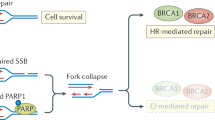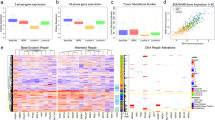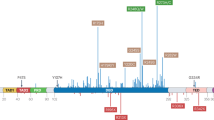Abstract
Lack of p53 or mismatch repair (MR) function and scarce cell proliferation are commonly associated with tumor cell resistance to antineoplastic agents. Recently, inhibition of poly(ADP-ribose) polymerase (PARP) has been considered as a tool to overcome resistance of MR-deficient tumors to methylating agents. In the present study we demonstrated that infection with p53 expressing adenovirus (Ad-p53), enhances chemosensitivity of MR-deficient tumor cell lines to the methylating agent temozolomide (TZM), either used as single agent or, more efficiently, when combined with PARP inhibitor. Moreover, the association of Ad-p53 with drug treatment induced a more pronounced growth inhibitory effect than that provoked by Ad-p53 infection only. Cells, growth arrested by p53 transduction, and then subsequently exposed to the drugs, were still highly susceptible to cytotoxicity induced by TZM and PARP inhibitor. The results suggested that this drug combination might be effective even in non-proliferating tumor cells. It is conceivable to envisage future possible strategies to enhance cytostatic or cytotoxic effects induced by Ad-p53, based on the use of TZM, alone or combined with PARP inhibitor for the therapy of resistant tumors. Cell Death and Differentiation (2001) 8, 457–469
Similar content being viewed by others
Log in or create a free account to read this content
Gain free access to this article, as well as selected content from this journal and more on nature.com
or
Abbreviations
- MR:
-
mismatch repair
- BER:
-
base excision repair
- TZM:
-
temozolomide
- PARP:
-
poly(ADP-ribose) polymerase
- Ad:
-
adenovirus
- MOI:
-
multiplicity of infection
- beta-Gal:
-
beta-galactosidase
- 3-AB:
-
3-aminobenzamide
- 5-BrdU:
-
5-bromodeoxyuridine
- TS:
-
thymidylate synthase
- 5-FU:
-
5-fluorouracil
- raltitrexed:
-
N-[5-[N-(3,4-dihydro-2-methyl-4-oxoquinazolin-6-ylmethyl)-N-methylamino]-2-thenoyl]-L-glutamic acid
- O.D.:
-
optical densities
- PI:
-
propidium iodide
References
Hartwell LH, Kastan MB . 1994 Cell cycle control and cancer Science 266: 1821–1828
Kastan MB, Canman CE, Leonard CJ . 1995 p53, cell cycle control and apoptosis: implications for cancer Cancer Metastasis Rev. 14: 3–15
Levine AJ . 1997 p53, the cellular gate-keeper for growth and division Cell 88: 323–331
Lowe S, Bodis S, McClatchey A, Remington L, Ruley HE, Fisher DE, Housman DE, Jacks T . 1994 p53 status and the efficacy of cancer therapy in vivo Science 266: 807–810
Liu TJ, el-Naggar AK, McDonnell TJ, Steck KD, Wang M, Taylor DL, Clayman GL . 1995 Apoptosis induction mediated by wild-type p53 adenoviral gene transfer in squamous cell carcinoma of the head and neck Cancer Res. 55: 3117–3122
Gomez-Manzano C, Fueyo J, Kyritsis AP, Steck PA, Roth JA, McDonnel TJ, Steck KD, Levin VA, Yung WK . 1996 Adenovirus-mediated transfer of the p53 gene produces rapid and generalized death of human glioma cells via apoptosis Cancer Res. 56: 694–699
Liu TJ, Zhang WW, Taylor DL, Roth JA, Goepfert H, Clayman GL . 1994 Growth suppression of human head and neck cancer cells by the introduction of a wild-type p53 gene via a recombinant adenovirus Cancer Res. 54: 3662–3667
Harris MP, Sutjipto S, Wills KN, Hancock W, Cornell D, Johnson DE, Gregory RJ, Shepard HM, Maneval DC . 1996 Adenovirus-mediated p53 gene transfer inhibits growth of human tumor cells expressing mutant p53 protein Cancer Gene Ther. 3: 121–130
Nielsen LL, Maneval DC . 1998 p53 tumor suppressor gene therapy for cancer Cancer Gene Ther. 5: 52–63
Levine AJ, Momand J, Finlay CA . 1991 The p53 tumour suppressor gene Nature 351: 453–456
Baker SJ, Fearon ER, Nigro JM, Hamilton S, Preisinger AC, Jessup JM, vanTuinen P, Ledbetter DH, Barker DF, Nakamura Y, White R, Vogelstein B . 1989 Chromosome 17 deletions and p53 gene mutations in colorectal carcinomas Science 244: 217–221
Ben-Yehuda D, Krichevsky S, Caspi O, Rund D, Polliack A, Abeliovich D, Zelig O, Yahalom V, Paltiel O, Or R, Peretz T, Ben-Neriah S, Yehuda O, Rachmilewitz EA . 1996 Microsatellite instability and p53 mutations in therapy related leukemia suggest a mutator phenotype Blood 88: 4296–4303
Zhu YM, Das-Gupta EP, Russell NH . 1999 Microsatellite instability and p53 mutations are associated with abnormal expression of the MSH2 gene in adult acute leukemia Blood 94: 733–740
Wattel E, Preudhomme C, Hecquet B, Vanrumbeke M, Quesnel B, Dervite I, Morel P, Fenaux P . 1994 p53 mutations are associated with resistance to chemotherapy and short survival in hematologic malignancies Blood 84: 3148–3157
Zhu YM, Foroni L, McQuacker IG, Papaioannou M, Haynes A, Russel HH . 1999 Mechanisms of relapse in acute leukemia: Involvement of p53 mutated subclones in disease progression in acute lymphoblastic leukaemia Br. J. Cancer 79: 1151–1157
Jiricny J . 1998 Eukaryotic mismatch repair: an update Mutat. Res. 409: 107–121
Fink D, Aebi S, Howell SB . 1998 The role of DNA mismatch repair in drug resistance Clin. Cancer Res. 4: 1–6
D'Atri S, Tentori L, Lacal PM, Graziani G, Pagani E, Benincasa E, Zambruno G, Bonmassar E, Jiricny J . 1998 Involvement of the mismatch repair system in temozolomide-induced apoptosis Mol. Pharmacol. 54: 334–341
Tentori L, Lacal PM, Benincasa E, Franco D, Faraoni I, Bonmassar E, Graziani G . 1998 Role of wild-type p53 on the antineoplastic activity of temozolomide alone or combined with inhibitors of poly(ADP-ribose) polymerase J. Pharmacol. Exp. Ther. 285: 884–893
Tentori L, Turriziani M, Franco D, Serafino A, Levati L, Roy R, Bonmassar E, Graziani G . 1999 Treatment with temozolomide and poly(ADP-ribose) polymerase inhibitors induces early apoptosis and increases base excision repair gene transcripts in leukemic cells resistant to triazene compounds Leukemia 13: 901–909
Newlands ES, Stevens MF, Wedge SR, Wheelhouse RT, Brock C . 1997 Temozolomide: a review of its discovery, chemical properties, pre-clinical development and clinical trials Cancer Treat. Rev. 23: 35–61
Wedge SR, Porteous JK, Newlands ES . 1996 3-aminobenzamide and/or O6-benzylguanine evaluated as an adjuvant to temozolomide or BCNU treatment in cell lines of variable mismatch repair status and O6-alkylguanine-DNA alkkyltransferase activity Br. J. Cancer 74: 1030–1036
Liu L, Taverna P, Whitacre CM, Chatterjee S, Gerson SL . 1999 Pharmacologic disruption of base excision repair sensitizes mismatch repair-deficient and -proficient colon cancer cells to methylating agents Clin. Cancer Res. 5: 2908–2917
Wilson III DM, Thompson LH . 1997 Life without DNA repair Proc. Natl. Acad. Sci. USA 94: 12754–12757
Fujiwara T, Grimm EA, Mukhopadhyay T, Zhang WW, Owen-Shaub LB, Roth JA . 1994 Induction of chemosensitivity in human lung cancer cells in vivo by adenovirus-mediated transfer of the wild-type p53 gene Cancer Res. 54: 2287–2291
Katayose D, Gudas J, Nguyen H, Srivastava S, Cowan KH, Seth P . 1995 Cytotoxic effects of adenovirus-mediated wild-type p53 protein expression in normal and tumor mammary epithelial cells Clin. Cancer Res. 1: 889–897
Ogawa N, Fujiwara T, Kagawa S, Nishizaki M, Morimoto Y, Tanida Y, Hizuta A, Yasuda T, Roth JA, Tanaka N . 1997 Novel combination therapy for human colon cancer with adenovirus-mediated wild-type p53 gene transfer and DNA-damaging chemotherapeutic agent Int. J. Cancer 73: 367–370
Cirielli C, Riccioni T, Yang C, Pili R, Gloe T, Chang J, Inyaku K, Passaniti A, Capogrossi MC . 1995 Adenovirus-mediated gene transfer of wild-type p53 results in melanoma cell apoptosis in vitro and in vivo Int. J. Cancer 63: 673–679
Li H, Lochmuller H, Yong VW, Tarpati G, Nalbantoglu J . 1997 Adenovirus-mediated wild-type p53 gene transfer and overexpression induces apoptosis of human glioma cells independent of endogenous p53 status J. Neuropathol. Exp. Neurol. 56: 872–878
Fujiwara T, Grimm EA, Mukhopadhyay T, Cai DW, Owen-Schaub LB, Roth JA . 1993 A retroviral wild-type p53 expression vector penetrates human lung cancer spheroids and inhibits growth by inducing apoptosis Cancer Res. 53: 4129–4133
Blagosklonny MV, el-Deiry WS . 1996 In vitro evaluation of a p53-expressing adenovirus as an anti-cancer drug Int. J. Cancer 67: 386–392
Wattel E, Vanrumbeke M, Abina MA, Cambier N, Preudhomme C, Haddada H, Fenaux P . 1996 Differential efficacy of adenoviral mediated gene transfer into cells from hematological cell lines and fresh hematological malignancies Leukemia 10: 171–174
el-Deiry WS, Tokino T, Velculescu VE, Levy DB, Parsons R, Trent JM, Lin D, Mercer WE, Kinzler KW, Vogelstein B . 1993 WAF1, a potential mediator of p53 tumor suppression Cell 75: 817–825
el-Deiry WS, Harper JW, O'Connor PM, Velculescu VE, Canman CE, Jackman J, Pietenpol JA, Burrell M, Hill DE, Wang Y, Wiman KG, Mercher WE, Kastan MB, Kohn KW, Elledge SJ, Kinzler KW, Vogelstein B . 1994 WAF1/CIP1 is induced in p53-mediated G1 arrest and apoptosis Cancer Res. 54: 1169–1174
Franchi A, Papa G, D'Atri S, Piccioni D, Masi M, Bonmassar E . 1992 Cytotoxic effects of dacarbazine in patients with acute myelogenous leukemia: a pilot study Haematologica 77: 146–150
Bower M, Newlands ES, Bleehen NM, Brada M, Begent RJ, Calvert H, Colquhoun I, Lewis P, Brampton MH . 1997 Multicentre CRC phase II trial of temozolomide in recurrent or progressive high-grade glioma Cancer Chemother. Pharmacol. 40: 484–488
Yung WK, Prados MD, Yaya-Tur R, Rosenfeld SS, Brada M, Friedman HS, Albright R, Olson J, Chang SM, O'Neill AM, Friedman AH, Bruner J, Yue N, Dungan M, Zaknoen S, Levin VA . 1999 Multicenter phase II trial of temozolomide in patients with anaplastic astrocytoma or anaplastic oligoastrycytoma at first relapse: Temodal Brain Tumor Group J. Clin. Oncol. 17: 2762–2771
Bleehen NM, Newlands ES, Lee SM, Thatcher N, Selby P, Calvert AH, Rustin GJ, Brampton M, Stevens MF . 1995 Cancer Research Campaign phase II trial of temozolomode in metastatic melanoma J. Clin. Oncol. 13: 910–913
Middleton MR, Grob JJ, Aaronson N, Fierlbeck G, Tilgen W, Seiter S, Gore M, Aamdal S, Cebon J, Coates A, Dreno B, Henz M, Schadendorf D, Kapp A, Weiss J, Fraass U, Statkevich P, Muller M, Thatcher N . 2000 Randomized phase III study of temozolomide versus dacarbazine in the treatment of patients with advanced metastatic malignant melanoma J. Clin. Oncol. 18: 158–166
Biroccio A, Bufalo DD, Ricca A, D'Angelo C, D'Orazi G, Sacchi A, Soddu S, Zupi G . 1999 Increase of BCNU sensitivity by wt-p53 gene therapy in glioblastoma lines depends on the administration schedule Gene Ther. 6: 1064–1072
Blagosklonny MV, el-Deiry WS . 1998 Acute overexpression of WT p53 facilitates anticancer drug-induced death of cancer and normal cells Int. J. Cancer 75: 933–940
Yang B, Eshleman JR, Berger NA, Markowitz SD . 1996 Wild-type p53 protein potentiates cytotoxicity of therapeutic agents in human colon cancer cells Clin. Cancer Res. 2: 1649–1657
Gurnani M, Lipari P, Dell J, Shi B, Nielsen LL . 1999 Adenovirus-mediated p53 gene therapy has greater efficacy when combined with chemotherapy against human head and neck, ovarian prostate and breast cancer Cancer Chemother. Pharmacol. 44: 143–151
Clayman GL, Frank DK, Bruso PA, Goepfert H . 1999 Adenovirus-mediated wild-type p53 gene transfer as a surgical adjuvant in advanced head and neck cancers Clin. Cancer Res. 5: 1715–1722
Swisher SG, Roth JA, Nemunaitis J, Lawrence DD, Kemp BL, Carrasco CH, Connors DG, El-Naggar AK, Fossella F, Glisson BS, Hong WK, Khuri FR, Kurie JM, Lee JJ, Lee JS, Mack M, Merritt JA, Nguyen DM, Nesbitt JC, Perez-Soler R, Pisters KMW, Putnam Jr JB, Richli WR, Savin M, Schrump DS, Shin DM, Shulkin A, Walsh GL, Wait J, Weill D, Waugh MKA . 1999 Adenovirus-mediated p53 gene transfer in advanced non-small-cell lung cancer J. Natl. Cancer Inst. 91: 763–771
Habib NA, Hodgson HJ, Lemoine N, Pignatelli M . 1999 A phase I/II study of hepatic artery infusion with wtp53-CMV-Ad in metastatic malignant liver tumours Hum. Gene Ther. 10: 2019–2034
Pirollo KF, Hao Z, Rait A, Jang YJ, Fee Jr WE, Ryan P, Chiang Y, Chang EH . 1997 p53-mediated sensitization of squamous cell carcinoma of the head and neck to radiotherapy Oncogene 14: 1735–1746
Kat A, Thilly WG, Fang WH, Longley MJ, Li GM, Modrich P . 1993 An alkylation-tolerant, mutator human cell line is deficient in strand-specific mismatch repair Proc. Natl. Acad. Sci. USA 90: 6424–6428
Iwamoto KS, Mizuno T, Ito T, Tsuyama N, Kyoizumi S, Seyama T . 1996 Gain-of-function p53 mutations enhance alteration of the T-cell receptor following X-irradiation, independently of the cell cycle and cell survival Cancer Res. 56: 3862–3865
Shibata D, Peinado MA, Ionov Y, Malkhosyan S, Perucho M . 1994 Genomic instability in repeated sequences is an early somatic event in colorectal tumorigenesis that persists after transformation Nat. Genet. 6: 273–281
Take Y, Kumano M, Teraoka H, Nishimura S, Okuyama . 1996 A DNA-dependent protein kinase inhibitor (OK-1035) suppresses p21 expression in HCT116 cells containing wild-type p53 induced by adriamycin Biochem. Biophys. Res. Commun. 221: 207–212
Levati L, Marra G, Lettieri T, D'Atri S, Vernole P, Tentori L, Lacal PM, Pagani E, Bonmassar E, Jiricny J, Graziani G . 1998 Mutation of the mismatch repair gene hMSH2 and hMSH6 in a human T-cell leukemic line tolerant to methylating agents Genes Chromosome Cancer 3: 159–166
da Costa LT, Liu B, el-Deiry W, Hamilton SR, Kinzler KW, Vogelstein B, Markowitz S, Willson JK, de la Chapelle A, Downey KM, So AG . 1995 Polymerase delta variants in RER colorectal tumors Nat. Genet. 9: 10–11
Papadopoulos N, Nicolaides NC, Wei YF, Ruben SM, Carter KC, Rosen CA, Haseltine WA, Fleischmann RD, Fraser CM, Adams MD, Venter JC, Hamilton SR, Petersen GM, Watson P, Lynch HT, Peltomaki P, Mecklin J-P, de le Chapelle A, Kinzler KW, Vogelstein B . 1994 Mutation of a mutL homologue in hereditary colon cancer Science 263: 1625–1629
Parsons R, Li GM, Longley MJ, Fang WH, Papadopoulos N, Jen J, de la Chapelle A, Kinzler KW, Vogelstein B, Modrich P . 1993 Hypermutability and mismatch repair deficiency in RER+ tumor cells Cell 75: 1227–1236
Duthu A, Debuire B, Romano J, Ehrhart JC, Fiscella M, May E, Appella E, May P . 1992 p53 mutations in Raji cells: characterization and localization relative to other Burkitt's lymphomas Oncogene 7: 2161–2167
Nagasawa H, Li CY, Maki CG, Imrich AC, Little JB . 1995 Relationship between radiation-induced G1 phase arrest and p53 function in human tumor cells Cancer Res. 55: 1842–1846
Boulton S, Pemberton LC, Porteous JK, Curtin NJ, Griffin RJ, Golding BT, Durkacz BW . 1995 Potentiation of temozolomide-induced cytotoxicity: a comparative study of the biological effects of poly(ADP-ribose) polymerase inhibitors Br. J. Cancer 72: 849–856
Acknowledgements
This study was supported by a grant from the Italian Association for Cancer Research (AIRC) and by MURST (Molecular bases for the pharmacological control of neoplastic diseases). The authors would like to thank Dr. A Bergamini (University of Rome ‘Tor Vergata’) for suggestions on Ad infection and C Mastrilli and G Bonelli for their excellent technical assistance.
Author information
Authors and Affiliations
Corresponding author
Additional information
Edited by L Fesus
Rights and permissions
About this article
Cite this article
Tentori, L., Portarena, I., Bonmassar, E. et al. Combined effects of adenovirus-mediated wild-type p53 transduction, temozolomide and poly (ADP-ribose) polymerase inhibitor in mismatch repair deficient and non-proliferating tumor cells. Cell Death Differ 8, 457–469 (2001). https://doi.org/10.1038/sj.cdd.4400832
Received:
Revised:
Accepted:
Published:
Issue date:
DOI: https://doi.org/10.1038/sj.cdd.4400832
Keywords
This article is cited by
-
Unveiling the vulnerabilities of synthetic lethality in triple-negative breast cancer
Clinical and Translational Oncology (2023)
-
Pharmacological inhibition of poly(ADP-ribose) polymerase-1 modulates resistance of human glioblastoma stem cells to temozolomide
BMC Cancer (2014)
-
Protein kinase Cα protects against multidrug resistance in human colon cancer cells
Molecules and Cells (2012)
-
Poly(ADP-ribose) polymerase and the therapeutic effects of its inhibitors
Nature Reviews Drug Discovery (2005)
-
Temozolomide induces apoptosis and senescence in glioma cells cultured as multicellular spheroids
British Journal of Cancer (2003)



